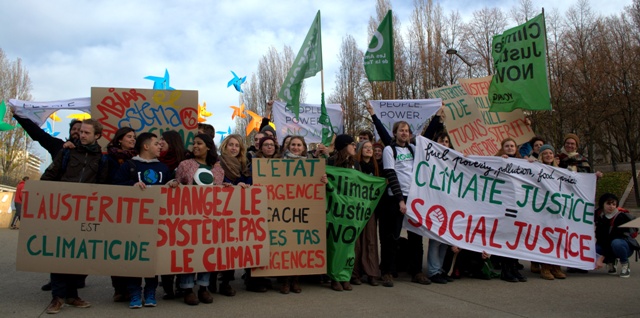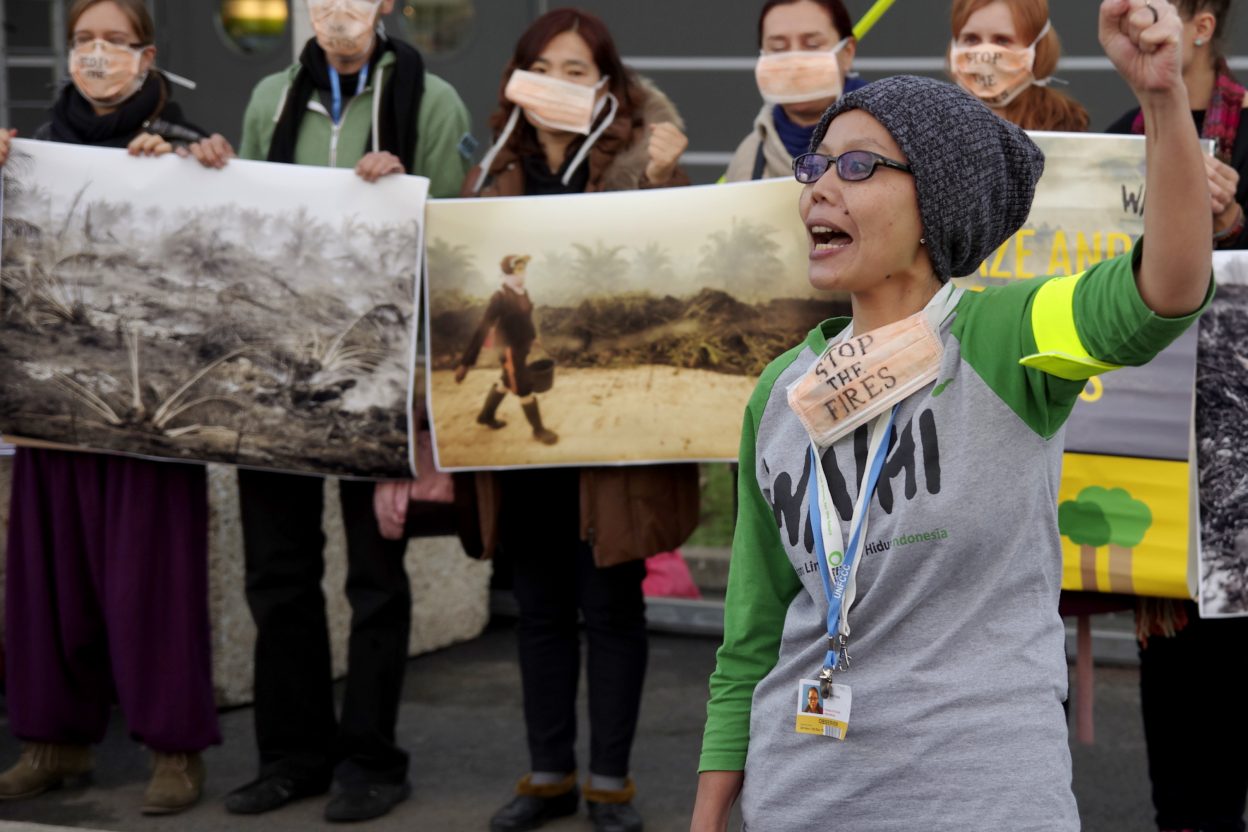Jamie Gorman & Romina Ranke from Young Friends of The Earth Europe, beautifully summarise why is it important to stand in solidarity with social and climate movements from Global South, and why frontline communities fighting climate change are building the real solutions to the climate crisis.
After 21 years with no sign of equity or justice, the climate circus has once again set out its stall in an airport north of Paris which has been converted to a special UN summit centre. With sponsorship from the likes of Air France and French fossil giant Engie, this summit continues the sickening trend to celebrate polluters as part of “the solution” while negotiators from the Global North attack the key principle of equity and do all they can to avoid taking their fair share of their “climate debt”.
Climate justice, as well as the equity principles that underpin the UN climate convention, make it clear that industrialised countries must make deep emission cuts, while also providing finance, adaptation, technology transfer and capacity building for the global South. Emissions cuts and adaptation support must reflect countries’ fair share of historical responsibility for the climate crisis. A fair and ambitious agreement must also include reparations for loss and damage and support for affected communities at the frontline of climate change.
But with the negotiations captured by corporations and failing to meet the needs of frontline communities, we know that climate justice will not be achieved in this space without a strong movement on the ground. Yet the climate conference remains an important site in the struggle for democracy and Young Friends of the Earth Europe (YFoEE) are at the negotiations for two reasons: to stand in solidarity with social movements from the global South, indigenous and marginalised communities; and to unmask the corporate capture of the climate talks by companies from Europe and the global North. The bitter fact though, is that real climate justice voices are systematically marginalised inside the climate conference. The size of government delegations from the global North dwarf those of the South and they use their power to stall and block negotiation on vital questions of equity and fair shares for Southern delegations.
Given the expense of attending and the complexity of the processes, civil society at the climate conferences is often dominated by the northern NGOs that have the most resources and capacity. This is highly problematic for a number of reasons. Firstly, environmental justice calls for equity, but it also demands the recognition of diverse identities and experiences, placing the voices of marginalised and oppressed groups front and centre in the fight for justice. By not stepping back and making space for frontline communities and those experiencing oppression, we compound injustice by silencing these voices.
As YFoEE we are recognising the need to challenge power and privilege, not just in the negotiations but in our own network. We are listening and learning from activists whose very existence is a site of struggle against oppression. Here at the negotiations we’ve had the chance to spend time with indigenous leaders like Lourdes Huanca Atencia, President of FEMUCARINAP (link in Spanish), a Peruvian indigenous women’s organisation fighting for women’s rights, access to land and water and against sexism. Her work in Peru, her views and her strength impressed us so much and her example inspired us as a role model for our own work and lives. Inside the conference we also took action alongside activists from WALHI Indonesia as they demanded an end to the Indonesian forest fires, haze and the corporate crimes that caused them.
For us, the conference has been a space with many inspiring activists, particularly from the global South and indigenous groups. But voices like Lourdes’ must fight to be heard above the privileged policy experts, never mind the business elites, who engage in these exclusive transnational spaces. Indeed our power as activists and movements does not come from being able to make good arguments in the controlled space of a consultation. Our power comes from building our movements to shift narratives, push limits and build the just and sustainable world we want. So, ultimately, to change the game and transform the system we need a stronger, broader leverage to put a pressure on governments that simply cannot be ignored.
To succeed in the fight for climate justice movements are connecting grassroots resistance against dirty energy and extractivism all over the world, but also recognising that this fight is bigger than climate change. It is a broader struggle against injustice and oppression. As YFoEE we believe we must join the struggles against neoliberalism, colonialism, patriarchy and poverty both in our analysis and physically on the streets: our solidarity must translate to action. This is why YFoEE joined the march against unemployment and poverty yesterday in Paris. Marching behind the sans-papiers (undocumented migrants) block we listened to and echoed their calls.

As week one of the negotiations came to a close it’s clear that these UN conferences will continue to fail to bring about the systemic change we urgently need. The good news is we don’t need to wait for those solutions to arise. They are already developed and fought for on local and national levels all around the world. Local initiatives are strengthening cycling in cities, developing sustainable lifestyles, establishing ways of sharing instead of buying and owning. Throughout the world, grassroots movements are winning fights against fracking, coal mining, oil drilling and other dirty energy projects. The communities on the Lofoten islands in Norway have succeeded in preventing oil drilling in their Arctic communities, while the groundswell of opposition to oil extraction in the Adriatic has halted the Croatian government’s plans to drill there.
And often, when they win their fights, communities begin to build real alternatives, like de-privatised and decentralised projects of community-run renewable power. In the UK, where communities have fought off fracking companies they have gone on to set up community energy co-operatives where the producers and consumers of energy are the same people. Indigenous people are fighting against deforestation. Small farmers have denounced land grabbing for many years. Their ways of life need finally to be recognised as the real solutions to the climate crisis.
These struggles and initiatives might happen in very different places around the world but they all have one thing in common. They resist the structures and power relations that are causing climate change and oppression by introducing alternatives for the economic and social transformation that we so urgently need. We are here in Paris to connect with these struggles and initiatives, share our experiences and learn from each other. It’s exciting to see how the climate movement is rooted more and more in community struggle. As YFoEE we are working to build alliances across differences, act in partnership with affected communities and support solutions to the climate crises like decentralised and community-owned renewable power.
As we denounce the corporate-sponsored climate conference we are helping to write the story of people power that no amount of greenwashing can hide.

